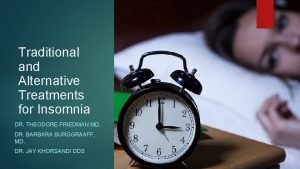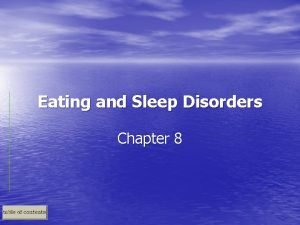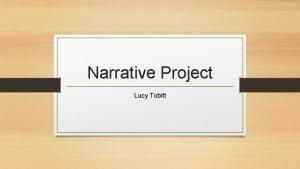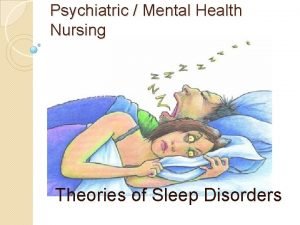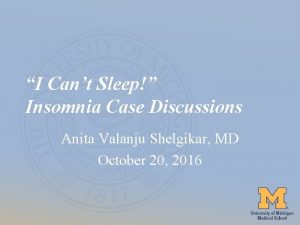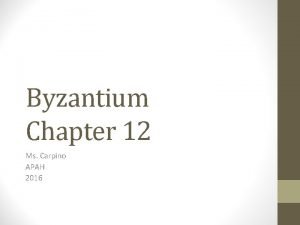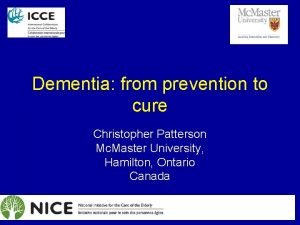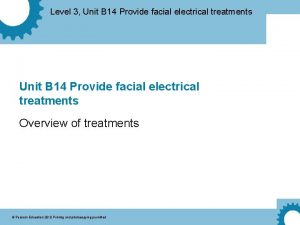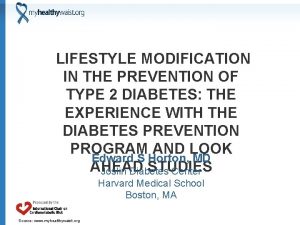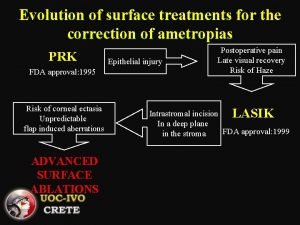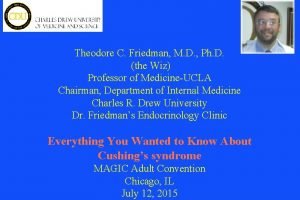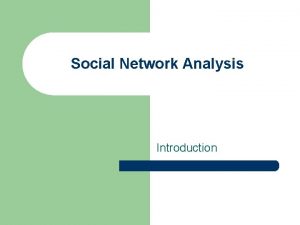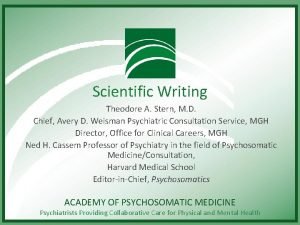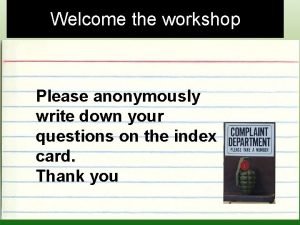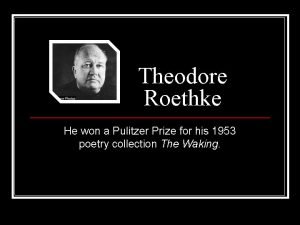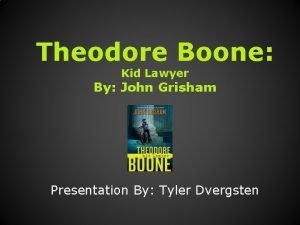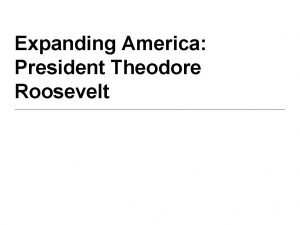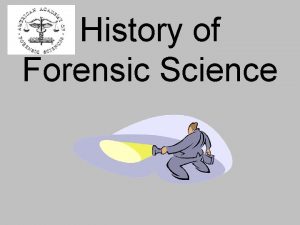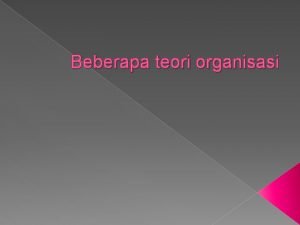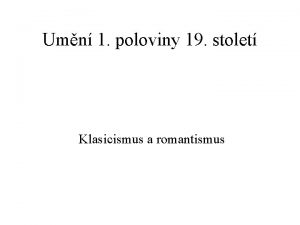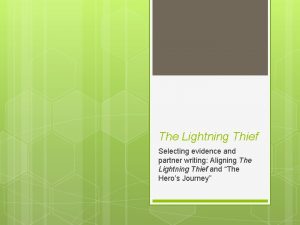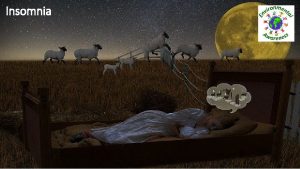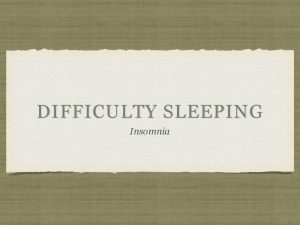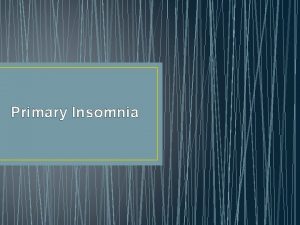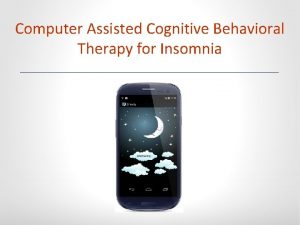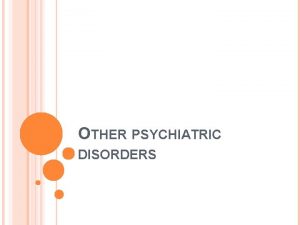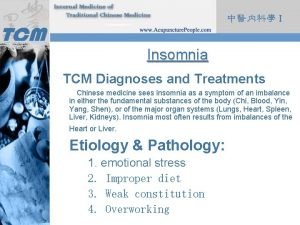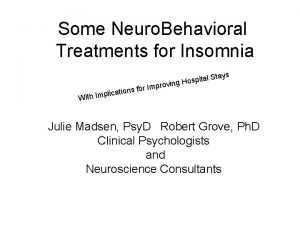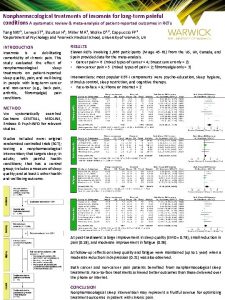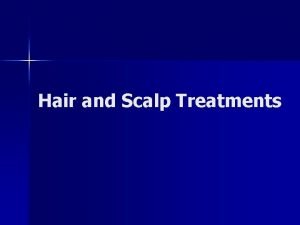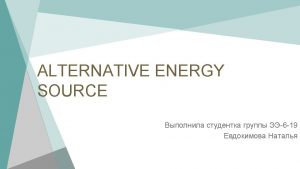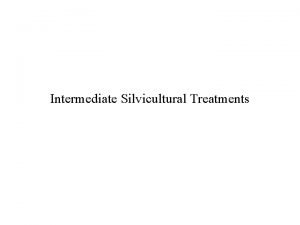Traditional and Alternative Treatments for Insomnia DR THEODORE







































- Slides: 39

Traditional and Alternative Treatments for Insomnia DR. THEODORE FRIEDMAN MD, DR. BARBARA BURGGRAAFF, MD, DR. JAY KHORSANDI DDS

Introductions Dr. Theodore Friedman Chairman, Department of Internal Medicine Chief, Division of Endocrinology, Metabolism and Molecular Medicine Endowed Professor of Cardio-Metabolic Medicine Lead Physician, Endocrinology, Martin Luther King, Jr. Outpatient Center Chairman, DHS Endocrinology Work Group Professor of Medicine-Charles R. Drew University of Medicine & Science

Introductions Dr. Barbara Burggraaff Dual Boarded ENT (Ear Nose Throat) and Sleep Physician Medical Director for Snore Experts Fellow American Academy of Otolaryngology-Head and Neck Surgery Fellow American Academy of Sleep Medicine Medical humanitarian work in Nepal, Hiking, Horses and Oil Painting Meditation Enthusiast

Introductions Dr. Jay Khorsandi Practicing healthcare dentistry and sleep for almost 20 years Private practice owner in Los Angeles for 10 years Was co-founder and Chief Dental Officer for a start-up Dental Service Organization (DSO) in New York Transitioned to Sleep about 5 years ago exclusively Member of ADA, CDA, LADS, AADSM, CA Sleep Society Co-developer of an oral appliance. "Zyppah-K" Delivered more CPAP's than any dentist in the country Top provider of Night. Lase – Laser Snoring Therapy Biohacker and Sleep Enthusiast

Before we begin. . FREE GIVEAWAY at the end of the webinar! You'll want to stay tuned as we will be giving away a bottle of an amazing supplement that can help you calm the mind down and sleep better! More details at the end!

Why do we sleep? Three R's • • • Rest: • A time to slow down • Give your body a chance to recover from the day • Energy needs go down. Heart rate goes down. Digestion slows Recharge • Biochemical processes in the brain • Hormone regulation (leptin vs ghrelin) • Glymphatic system (brain flush system) Restore • Deep sleep and growth hormone (body repair) • REM sleep and dreaming/memory consolidation (brain. . . repair. . . think of it like disk defrag on your hard drive)

What controls our sleep? 2 Components: Rhythm and Drive Rhythm AKA, your sleep/wake cycle Our body is regulated by internal clocks known as circadian rhythms Your brain is the main one but research is showing all major organ systems working optimally at different times of days Shift workers constantly battle with this Jet lag amplifies the consequences of sleep cycle

What controls our sleep? Drive - Pressure to Sleep It effectively reminds the body that it needs to sleep after a certain time Timer or counter that diminishes throughout the day The longer we have been awake, the stronger the desire and need to sleep becomes, and the more the likelihood of falling asleep increases The longer we have been asleep, the more the pressure to sleep dissipates, and the more the likelihood of awakening increases.

Trouble Falling Asleep and Waking Up Falling Asleep Work related stress Acute pyschological or physical trauma Family stress Lifestyle choices Waking Up Waking up in the middle of night (bathroom trips, brain energy expenditure, sleep apnea) Trouble waking up in the morning = Insomnia, Snoring, Sleep Apnea

What kind of sleeper are you? AKA, what is your "Chronotype" Michael Breus "The Sleep Doctor" - The Power of When Book Lion Wolf Bear Dolphin

Lions (also known as early birds) Wake up early and are most productive in the morning. They get most of their productivity in before noon, so they’re naturally tired by the evening and go to sleep early. Lions represent 15 -20% of the population.

Wolves (also known as night owls) go to sleep and wake later than others. Their peak productivity happens in the middle of the day and in the evening after everyone else has already logged off. Wolves represent 15 -20% of the population.

Bears tend to sleep and wake according to the sun Feeling most energetic during the daytime and having no trouble falling asleep at night. Their peak productivity occurs in the mid-morning and dips during the mid-afternoon slump. They represent 50% of the population.

Dolphins are light sleepers who have difficulty following a regular sleep routine More frequent nighttime awakenings. Their most productive in the midmorning to early afternoon. Dolphins represent 10% of the population. Most likely to suffer from insomnia

Insomnia is difficulty falling asleep or staying asleep, even when a person has the chance to do so. People with insomnia can feel dissatisfied with their sleep and usually experience one or more of the following symptoms: Fatigue, low energy, difficulty concentrating, mood disturbances, and decreased performance in work or at school.

Menopause Hormonal Causes of Insomnia Cushing’s syndrome High cortisol at night Growth Hormone deficiency Hyperthyroidism or over-replacement with thyroid medication Adrenal insufficiency (need some cortisol before bedtime)

Cortisol in Adrenal Insufficiency Patients with adrenal insufficiency needed some cortisol to go into deep sleep I give 2. 5 -5 mg of hydrocortisone to patients with adrenal insufficiency before bedtime Too much and too little cortisol is bad for sleep

Menopause: Most Common Symptoms Cessation of menses for 12 consecutive months Hot flashes or hot flushes Night Sweats Insomnia Palpitations Depression and Anxiety Memory loss and change in cognition Vaginal dryness and thinning Urinary dysfunction Change to sexual response and sex drive Acne Hair loss Irregular bleeding

Treatments for Insomnia Behavioral Psychological Medical Hormonal Alternative

Sleep Hygiene Keep a consistent sleep and awake cycle Light control: Keep a pitch black room Behavioral Options Temp control: Cool. . 68 degrees or less Avoid alcohol with 4 hours of bed Diet: Try to eat around sunset and not too close to bedtime Electronics: No phones, tablets or TV's within 1 hour of sleep Make sure you or your partner does not snore or have apnea

CBT-I – Cognitive Behavioral Therapy for Insomnia Psychological Goal is to work with therapist to control or eliminate negative thoughts and actions that keep you awake Recognize and change beliefs that affect your ability to sleep Is generally recommended as the first line of treatment for people with insomnia. Typically, CBT-I is equally or more effective than sleep medications.

Medical Involves prescription pharmaceutical medications Will require appointment with your doctor or sleep physician Potential side effects can range from daytime sleepiness to headaches and addiction Can be helpful for more short term uses

Pharmaceutical Mechanisms of Action BENZODIAZEPINE RECEPTOR AGONISTS triazolam (Halcion, Pfizer), estazolam (Pro. Som, Abbott), temazepam (Restoril, Mallinckrodt), quazepam (Doral, Questcor), and flurazepam All of these agents are Schedule IV controlled substances because of their potential for abuse or dependence NONBENZODIAZEPINES So-called "Z-Drugs" Zolpidem (Ambien and Intermezzo), zaleplon (Sonata), and eszopiclone (Lunesta) MELATONIN Natural hormone made by the pineal gland Try 3 mg then 1 mg or 10 mg MELATONIN AGONISTS: Ramelteon (Rozerem) Less likely for abuse

Pharmaceutical Mechanisms of Action – continued TRICYCLIC ANTIDEPRESSANTS Doxepin (Silenor) Headache and somnolence are the most common adverse events associated with doxepin OREXIN RECEPTOR ANTAGONIST: Suvorexant (Belsomra) New category of insomnia medications known as orexin receptor antagonists Orexins are neurotransmitters that regulate wakefulness and sleep Orexins play a role in keeping people awake and alert This medication blocks it's action (similar to people with narcolepsy)

Medicines That Can Cause Insomnia Thyroid replacement Selective serotonin reuptake inhibitors (antidepressants such as Prozac® and Zoloft®) Dopamine agonists (includes some medications for Parkinson's disease) Psychostimulants and amphetamines, Appetite suppressants Anticonvulsants Cold medicines and decongestants Bladder medicines: Ditropan and Myrbetrriq Steroids Beta agonists Theophylline Medications to lower blood pressure (alpha agonists, beta blockers, clonidine) Diuretics (don t take too late at night) Caffeine Alcohol Niacin

Hormone Treatments Estrogen/Progesterone for menopause Vitamin E 400 i. U a day helps with hot flashes Phosphotidyl Serine (Seriphos) 300 mg an hour before bedtime lowers night time cortisol DHEA-25 mg a day in women and 50 mg a day in men at night, counteracts cortisol Gingko bilabo 120 mg twice a day lowers cortisol Serovital raises growth hormone

Alternative Options Supplements + Light Control Meditation and Mindfulness EMF Mitigation Dietary Considerations

Alternative Options Supplements GABA with L-Theanine Melatonin Valerian 5 -HTP CBD oil Lavender and Chamomile Light Control Avoid cell phones, tablets and TV's Blue-light blocking glasses

Alternative Options Supplements GABA with L-Theanine Our brain naturally produces GABA--the premier ‘calm and connect’ neurotransmitter that inhibits or slows down nerve impulses. GABA supports rest and relaxation. L-Theanine, an amino acid found in green tea, also facilitates relaxation and calms without impairing cognition. Together, they help support a balanced state. 2 - 4 pumps sublingual recommended dosage

Alternative Options Supplements Melatonin is an antioxidant hormone naturally produced in the body. Supports a healthy sleep- wake cycle and normal circadian rhythms. May be beneficial in settings of jet lag, occasional sleeplessness, or altered sleep schedules due to shift work. 1 - 4 mg recommended dosage

Alternative Options Supplements CBD Oil Extremely popular in the market right now Therapeutic benefits can include anti-inflammatory properties, anti-anxiety properties, and may boost better quality sleep Calming and relaxing without the "high" of THC

Alternative Options Supplements GABA with L-Theanine Melatonin CBD oil Valerian 5 -HTP Lavender and Chamomile Light Control Avoid cell phones, tablets and TV's Blue-light blocking glasses

We carry them at Snore Experts locations Encino, Pasadena, Brentwood, Irvine, Valencia Where to find/buy these? Also available online @ www. snoreexperts. com in the "Store" section Also stay tuned for giveaway of a bottle of GABA (valued at $40)!!

Light Control Minimize blue light exposure at night Consider warm color LEDs or better yet. . . incandescent Phones, tablets, TV's should be avoided at least 1 hour prior to sleep Blue light blocking glasses can also be used

Alternative Options Meditation and Mindfullness Develop a meditation practice 2 x 10 min a day better than 1 x 20 min session Helps to evoke parasympathetic activation (aka relaxation response) Mindfullness = being in the present and not focusing on past or future Box Breathing Technique

Alternative Options EMF (electromagnetic frequencies) Mitigation Put your phone on airplane mode at night Keep away from your bed Put your wi-fi router on timer Examine your house for "smart meters" Don't use microwave oven anymore Buy an EMF meter and test around your house especially where you sleep

Alternative Options Diet Considerations Avoid eating after sunset or with 2 hours of sleep Avoid inflammatory foods (deep fried, carb heavy, gluten) Stay away from alcohol. Or stop 1 hour per drink Have low glycemic foods as night snacks (handful or walnuts or berries) Focus on healthy fats (avocados, salmon, nuts, extra virgin olive oil, MCT oil) No caffeine after 2 pm

Thank you! To learn more: www. snoreexperts. com Facebook – Snore. Experts Instagram – Snore. Experts Podcast – Best Night Ever

Questions? Please use the chat button Thank you for sharing your time tonight! If you have any more questions after tonight or want an appointment, please email: mail@goodhormonehealth. com www. goodhormonehealth. com Webinar will be posted in a few days and also available at https: //www. dropbox. com/sh/nsq 61 x 0 rvdcni 00/AAAps 1 JLD 1 zm 1 D-Je. Vasq. O 3 Va? dl=0
 Insomnia treatment
Insomnia treatment Bulimia and insomnia
Bulimia and insomnia Jeff wall insomnia
Jeff wall insomnia Athens insomnia scale
Athens insomnia scale Chronic insomnia
Chronic insomnia Chronic insomnia
Chronic insomnia Virgin and child between saints theodore and george
Virgin and child between saints theodore and george Dementia treatments and interventions near patterson
Dementia treatments and interventions near patterson Herbert stoddard
Herbert stoddard Theodore roosevelt college and career academy
Theodore roosevelt college and career academy Treatments for acute renal failure
Treatments for acute renal failure Facial electrical treatments level 3
Facial electrical treatments level 3 Multi treatment design
Multi treatment design Hiv treatments
Hiv treatments Diabetes treatments
Diabetes treatments Advanced surface treatments
Advanced surface treatments Teddy stoddard
Teddy stoddard La lionne dans seraphin
La lionne dans seraphin Dr theodore friedman
Dr theodore friedman Théodore de samos
Théodore de samos Theodore newcomb bennington college study
Theodore newcomb bennington college study Dr theodore stern
Dr theodore stern Theodore bedell jackson county ga
Theodore bedell jackson county ga Theodore streleski where is he now
Theodore streleski where is he now What are some quotes from open house by theodore roethke
What are some quotes from open house by theodore roethke Grisham kid lawyer
Grisham kid lawyer Theodore norvell
Theodore norvell Theodore s rappaport wireless communications
Theodore s rappaport wireless communications Theodore roosevelt imperialist policies
Theodore roosevelt imperialist policies Theodore roosevelt
Theodore roosevelt The word plum by helen chasin
The word plum by helen chasin Theodore james ryken
Theodore james ryken Bertillonage
Bertillonage Hücre büyüdükçe yüzey alanı/hacim oranı azalır mı
Hücre büyüdükçe yüzey alanı/hacim oranı azalır mı Theodore schwann
Theodore schwann Theodore mirvis
Theodore mirvis Theodore eugene garland
Theodore eugene garland Kelompok sosial menurut theodore caplow
Kelompok sosial menurut theodore caplow Dantova bárka
Dantova bárka Wilbur soot quotes
Wilbur soot quotes
